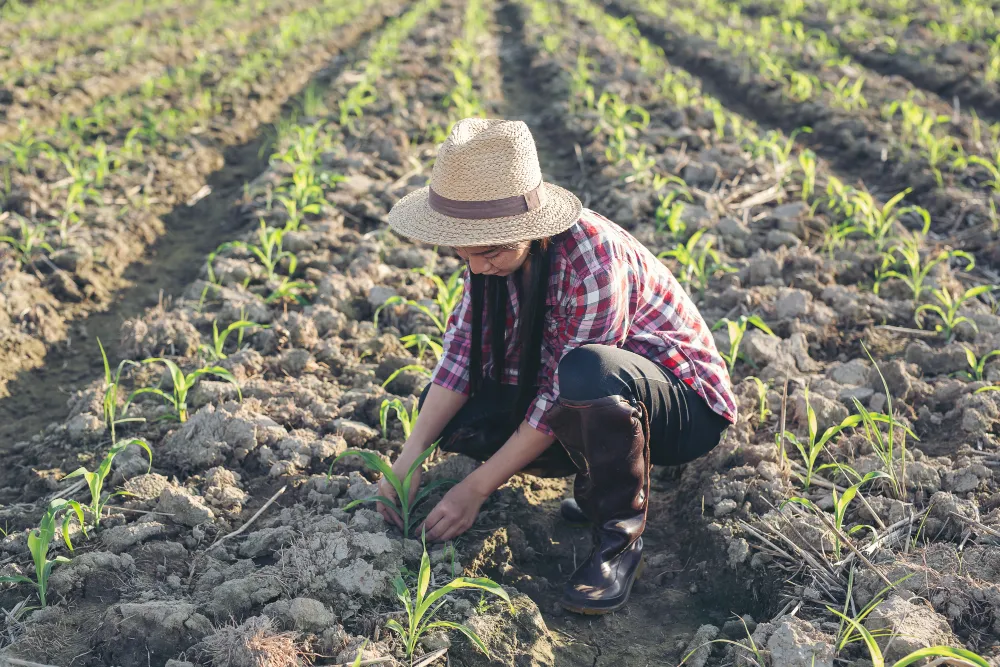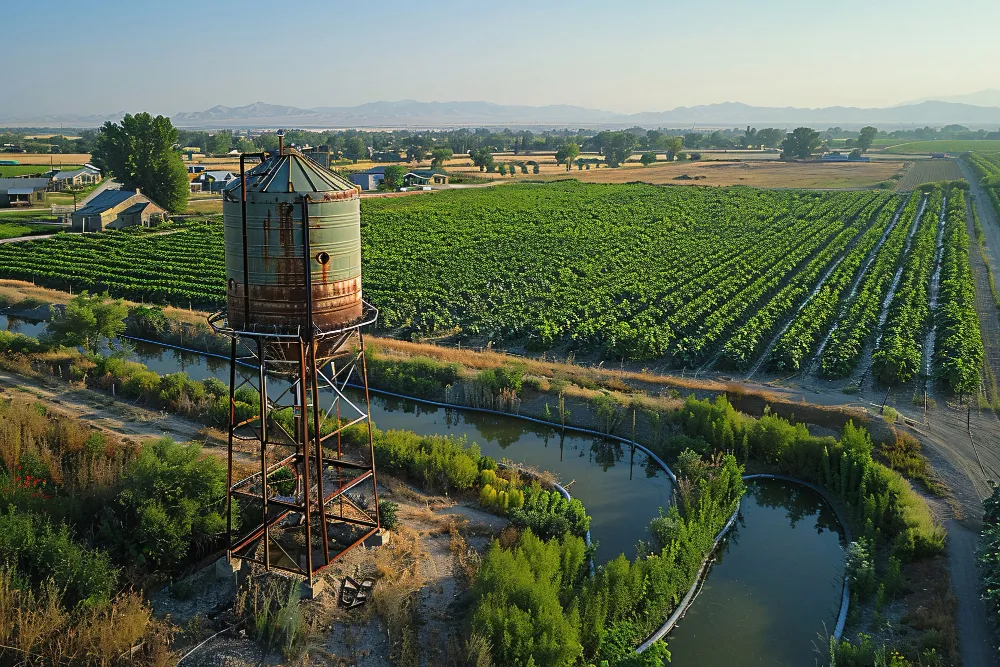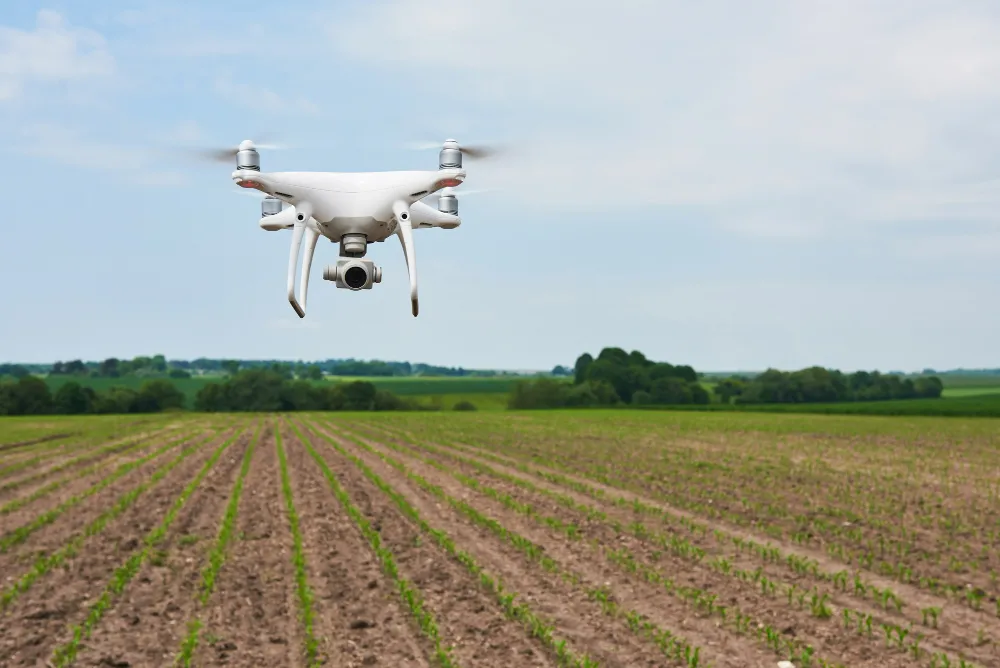Managing a farm effectively goes beyond simply growing crops or raising livestock—it’s about integrating a series of interconnected practices that drive productivity, sustainability, and profitability. Whether you’re stepping into farming for the first time or you’re a seasoned farmland owner, embracing the right management strategies is key to building a thriving and sustainable operation. In this article, we delve into top 10 essential farm management practices to help you optimize your farmland and secure its long-term success.
Sanjeevani Farms stands as a leading managed farmland provider near Bangalore, simplifying farm management for every farmland owner. By combining expert insights with hands-on support, we empower you to implement the best practices, ensuring exceptional results and sustainable growth. Our tailored solutions make managing your farmland seamless, allowing you to focus on reaping the rewards of your investment.
Understanding Farm Management Practices

Farm management practices refer to the strategic planning, organizing, and controlling of farm operations to meet production goals while ensuring profitability and sustainability. These practices include crop and livestock management, water conservation, pest control, financial planning, and the use of modern technology to optimize farm productivity.
Effective management practices help reduce waste, improve yield, and ensure that your farm remains competitive and resilient to challenges. By understanding and applying these practices, farmers can maximize their resources and maintain long-term success.
Top 10 Essential Farm Management Practices for Thriving Farmland in 2024
Effective farm management is key to ensuring the success and sustainability of your farmland.
Let’s explore top 10 essential farm management practices in 2024 that can optimize operations, increase productivity, and promote long-term land health.
Planning and Setting Clear Objectives

Planning is the foundation of effective farm management practices.
Without a clear plan, it’s difficult to track progress or identify areas for improvement.
- Set measurable and achievable goals: Establish clear objectives for crop yields, livestock health, and financial targets.
- Organize tasks effectively: Break down your goals into daily, weekly, and seasonal tasks to stay organized.
- Evaluate and adjust plans: Regularly review your progress and adjust goals based on performance or changes in the market.
Having a strategic plan in place ensures you have a roadmap to follow, helping you prioritize tasks, allocate resources efficiently, and focus on achieving long-term objectives.
Crop Rotation as Part of Effective Management

Crop rotation is one of the most valuable farm management practices to promote soil health and reduce pest problems.
Rotating crops helps replenish the soil’s nutrients and ensures that your farm remains productive over the years.
- Prevent soil depletion: Different crops have varying nutrient requirements, so rotating them helps maintain balanced soil nutrients.
- Control pests and diseases: Rotating crops helps disrupt the life cycles of pests that target specific crops.
- Improve soil structure: Rotating crops like legumes, which fix nitrogen in the soil, enhances the overall health and fertility of the soil.
By implementing crop rotation, you promote a more sustainable farming system that helps you maintain healthy, productive soil.
Efficient Water Management

Water is a critical resource for crops, but efficient water use is just as important as providing enough water for growth.
Efficient water management practices help ensure crops receive the right amount of water without wastage.
- Drip irrigation: This system delivers water directly to plant roots, reducing evaporation and runoff. It’s one of the most effective water-saving practices in farm management.
- Rainwater harvesting: Collecting rainwater for irrigation helps reduce dependence on groundwater, making it an eco-friendly practice in farm management.
- Soil moisture monitoring: Using soil moisture sensors helps ensure crops get the right amount of water, preventing both overwatering and underwatering.
By adopting these water-saving technologies and practices, you not only conserve water but also improve crop productivity.
Sustainable Fertilization Practices

Fertilization is essential for ensuring that crops receive the nutrients they need to grow. However, overuse of synthetic fertilizers can harm the soil and environment.
Sustainable fertilization practices are key to maintaining soil health.
- Use organic fertilizers: Compost, manure, and other organic options add nutrients without harming the soil or ecosystem.
- Apply fertilizers at the right time: Over-fertilizing can be as harmful as under-fertilizing. Apply fertilizers when the crop needs them most.
- Monitor soil health: Regular soil testing ensures you’re applying the right nutrients and at the proper amounts.
Sustainable fertilization practices reduce environmental impact and support the long-term health of your soil and crops.
Integrated Pest Management (IPM)

Pests are an inevitable part of farming, but using harmful chemicals can have a long-term negative impact on both the farm and the environment. Integrated Pest Management (IPM) is an eco-friendly solution.
- Cultural control: Rotate crops and use resistant varieties to naturally reduce pest populations.
- Biological control: Introduce natural predators, such as ladybugs or birds, to control pests.
- Chemical control: Use pesticides only when necessary and opt for eco-friendly options to limit the impact on the ecosystem.
By adopting IPM as part of your farm management practices, you can reduce pesticide use and create a balanced, sustainable farming system.
Soil Fertility and Conservation

Maintaining healthy, fertile soil is essential for growing strong, productive crops.
Soil fertility management and conservation are integral farm management practices for long-term farm success.
- Cover cropping: Planting cover crops during the offseason protects the soil from erosion, suppresses weeds, and adds organic matter to enhance fertility.
- No-till farming: This minimizes soil disruption and retains moisture, which aligns with sustainable farm management.
- Mulching: Applying mulch conserves soil moisture, suppresses weeds, and improves soil structure, making it an essential part of farm management.
Focusing on soil conservation and fertility ensures that your farm remains productive and resilient, boosting yields year after year.
Proper Harvesting and Post-Harvest Handling

Harvesting at the right time and managing crops properly after harvesting is crucial to maintaining the quality of your produce and preventing post-harvest losses.
- Harvest at peak maturity: Ensure crops are harvested at the right time to maximize quality and minimize spoilage, aligning with best farm management practices.
- Use proper harvesting tools: Clean, sharp tools prevent crop damage, which can reduce yield quality.
- Storage and processing: Proper storage ensures that harvested crops retain their value and nutritional content, preserving them for later use.
These post-harvest practices are vital in reducing losses and increasing profitability for your farm.
Livestock Management Best Practices

Proper livestock management is crucial for maintaining animal health, enhancing productivity, and ensuring sustainable farming practices.
- Provide proper nutrition: A balanced diet promotes healthy livestock and ensures consistent production of milk, meat, or wool.
- Regular veterinary care: Routine health check-ups and vaccinations keep your livestock disease-free, supporting better farm management.
- Sufficient space and shelter: Proper housing and adequate space help reduce stress and disease, enhancing animal welfare and productivity.
By applying effective livestock management practices, farmers can improve animal well-being and optimize farm productivity.
Use of Technology in Farm

Technology has revolutionized farmland management, making it easier to track and manage resources, crops, and livestock. From farm management software to automation, technology enhances efficiency.
- Farm management software: This helps in tracking farm activities, managing finances, and making data-driven decisions.
- Drones and GPS technology: These technologies help monitor crop health and soil conditions, improving precision farming techniques.
- Automated irrigation systems: These reduce water waste and optimize resource management, supporting sustainable farm practices.
By embracing technology, you streamline farm operations and increase productivity while reducing costs.
Financial Management and Record Keeping

Effective financial management ensures your farm operates within budget, increasing profitability and enabling reinvestment in the farm’s future.
- Track expenses and income: Record all financial transactions to assess cash flow and profitability.
- Plan for taxes and insurance: Properly manage taxes and secure insurance to protect your farm from unforeseen risks.
- Invest in improvements: Allocate funds for new equipment or farm improvements that will increase long-term productivity.
Strong financial planning and record-keeping practices ensure the success of your farm in the long run.
Conclusion
To succeed in farming, implementing effective farm management practices in 2024 is essential. Each of the 10 practices discussed above plays a significant role in increasing productivity, reducing costs, and ensuring sustainability.
As a leading provider of managed farmland near Bangalore, Sanjeevani Farms understands the importance of these farm management practices and helps farmers achieve the best outcomes.
If you are looking to take your farming operation to the next level, choosing a partner that understands the nuances of effective farm management is key. Choose Sanjeevani Farms for expert guidance and the best farmland solutions available.
Contact us today and start your farming journey with confidence.
FAQs
Find answers to common questions and get helpful insights on managing your farmland effectively in our FAQ section.
How can I ensure my farm remains profitable?
By implementing efficient farm management practices, such as careful planning, crop rotation, and using technology, you can maintain long-term profitability.
What are the benefits of crop rotation in farm management?
Crop rotation enhances soil health, reduces pest problems, and improves overall farm sustainability by following eco-friendly farm management practices.
How can technology help me manage my farm better?
Farm management software, drones, and automated systems improve farm efficiency, reduce labor costs, and optimize operations in modern farm management.
What is Integrated Pest Management (IPM) in farm management?
IPM combines biological, cultural, and mechanical methods with minimal chemical intervention to control pests sustainably, forming a crucial aspect of farm management practices.
Why is soil conservation important in farm management?
Soil conservation maintains fertility, prevents erosion, and ensures long-term farm productivity, making it essential for effective farm management.

